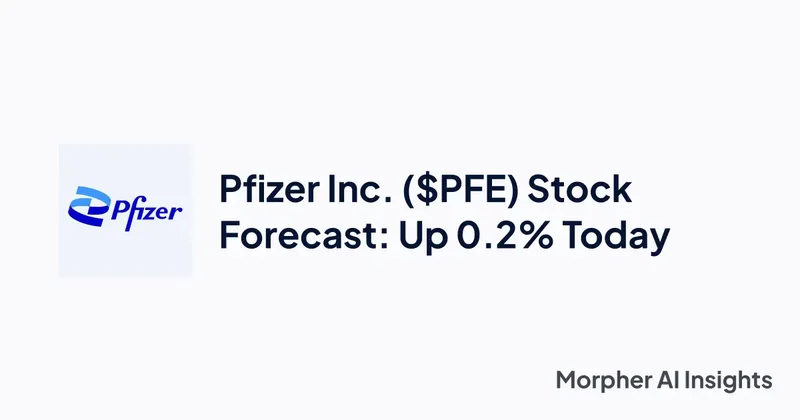XLM Insight | Stellar Lumens News, Price Trends & Guides
XLM Insight | Stellar Lumens News, Price Trends & Guides
Alright, folks, buckle up. Because while everyone's been hyper-focused on the immediate numbers from Pfizer's latest earnings report, I think we're missing the forest for the trees. Yes, sales are down, but profit guidance increased? That's not just good management; that's a signal. It's like watching a chess grandmaster sacrifice a pawn to set up a checkmate ten moves later.
The Big Idea here? It's not just about surviving a dip in COVID-related revenue; it's about aggressively pivoting to dominate the future of medicine, specifically the obesity market. And their recent moves suggest they are playing a very clever long game.
Remember the news about Pfizer acquiring Metsera? It barely made a ripple in the mainstream financial press. Some saw it as a risky bet. But I see it as a calculated strike. Metsera, for those who don't know, is a biotech firm laser-focused on next-gen obesity treatments. We are talking about injectable GLP-1 receptor agonists and amylin analogs... which, in simpler terms, are drugs that help regulate appetite and blood sugar.
Now, consider this alongside Pfizer's agreement with the U.S. government to ensure comparable drug prices. At first glance, it seems like a concession. But what if it's actually a brilliant preemptive move to clear the regulatory path for their future obesity drugs? What if they are betting that by playing ball now, they'll get preferential treatment when their Metsera pipeline hits the market?
It's like Pfizer is saying, "Sure, we'll play by your rules today, because tomorrow, we're going to own the game."
And get this, Pfizer even went so far as to file lawsuits against Metsera and Novo Nordisk. I mean, this is a serious move, a clear signal that Pfizer is not backing down from a fight. You don't sue unless you believe you have a strong case and a lot to win.

This reminds me of the early days of the internet. Companies were scrambling to lay fiber optic cables, not because they knew exactly how they'd make money tomorrow, but because they understood that whoever controlled the infrastructure would control the future. Pfizer is doing the same thing in the obesity market – building the infrastructure, securing the assets, and clearing the path for dominance.
When I look at these moves, I honestly get chills. This isn't just about quarterly earnings; this is about legacy. This is about positioning Pfizer as the go-to company for tackling one of the biggest health challenges of our time.
But here's the ethical tightrope we need to acknowledge: with great power comes great responsibility. As we develop more effective treatments for obesity, we must ensure access is equitable and affordable. We can't create a world where only the wealthy can afford to be healthy. That's not progress; that's a dystopia waiting to happen.
I stumbled upon a comment on Reddit that perfectly encapsulates this feeling: "It's exciting to see companies investing in obesity treatments, but we need to make sure these drugs are available to everyone, not just the privileged few." Exactly! This is a shared responsibility.
What does this mean for you? Imagine a future where obesity is no longer a life-threatening condition but a manageable one. Imagine the impact on healthcare costs, on productivity, on overall quality of life. It's a future worth fighting for, and Pfizer, in its own way, seems to be stepping up to the challenge.
The numbers don't lie: While the market might be focused on short-term setbacks, Pfizer tops estimates, raises profit guidance even as sales fall. They're not just playing chess; they're playing 4D chess, and the obesity market is their board. I, for one, am incredibly excited to see what their next move will be.